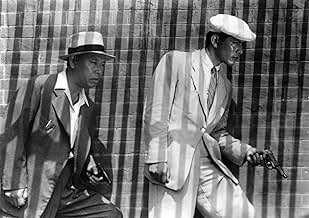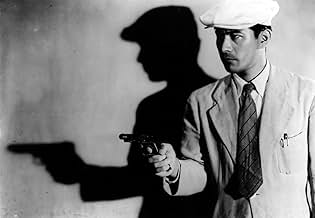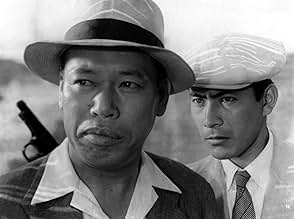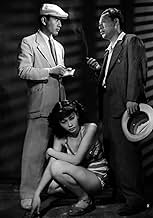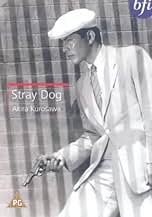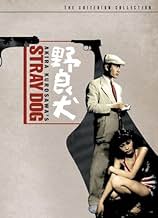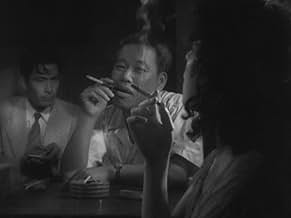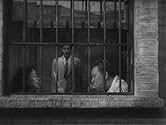During a sweltering summer, a rookie homicide detective seeks advice from a seasoned colleague while trying to track down his stolen Colt pistol.During a sweltering summer, a rookie homicide detective seeks advice from a seasoned colleague while trying to track down his stolen Colt pistol.During a sweltering summer, a rookie homicide detective seeks advice from a seasoned colleague while trying to track down his stolen Colt pistol.
- Director
- Writers
- Stars
- Awards
- 4 wins total
- Director
- Writers
- All cast & crew
- Production, box office & more at IMDbPro
7.820.4K
1
2
3
4
5
6
7
8
9
10
Featured reviews
Akira Kurosawa on the verge of greatness.
The following year, 1950, would see Kurosawa achieve his first major international success with the masterpiece Rashomon. Here, Kurosawa doesn't quite have the sureness of touch which would characterize most of his career, but Stray Dog is nevertheless a fine film noir and an effective exploration of Kurosawa's ideas about postwar Japan in particular and the human condition in general.
As you might expect from such a genius, Kurosawa is not satisfied with a simple good-guys/bad-guys cops-and-robbers story. He explores in depth the social and economic conditions in postwar Japan which led many young people--particularly returning veterans--to take to crime, and also the particular circumstances which motivate the acts of Yusa (Isao Kimura), the criminal. Indeed, a series of mistakes by the hero, rookie detective Murakami (Toshiro Mifune), are one factor behind Yusa's crimes.
But neither is Stray Dog a facile blame-society message film, either. Kurosawa makes no excuses for Yusa. By giving Murakami a very similar history (so similar, in fact, that it comes off as a little contrived), Kurosawa makes the point that Yusa had the same choice as Murakami. That he chose differently is his responsibility.
But even more interesting to me is the character of chief detective Sato (Takashi Shimura), Murakami's superior officer, mentor, and friend.
Sato is the wise elder figure in this film, and in the hands of a lesser artist than Kurosawa, such a character generally ends up as a mouthpiece for the director's own viewpoint. Here, though, Kurosawa permits Sato to espouse a hardcore law-and-order philosophy: The cops are the good guys, the crooks are the bad guys, and that's it. Sato has no patience for Murakami's guilt feelings or touchy-feely philosophizing.
That Kurosawa would permit this view (which is not Kurosawa's view, nor the film's) to be given voice by the film's wisest, kindest, most competent, and most likable character is a mark of his confidence and courage.
As you might expect from such a genius, Kurosawa is not satisfied with a simple good-guys/bad-guys cops-and-robbers story. He explores in depth the social and economic conditions in postwar Japan which led many young people--particularly returning veterans--to take to crime, and also the particular circumstances which motivate the acts of Yusa (Isao Kimura), the criminal. Indeed, a series of mistakes by the hero, rookie detective Murakami (Toshiro Mifune), are one factor behind Yusa's crimes.
But neither is Stray Dog a facile blame-society message film, either. Kurosawa makes no excuses for Yusa. By giving Murakami a very similar history (so similar, in fact, that it comes off as a little contrived), Kurosawa makes the point that Yusa had the same choice as Murakami. That he chose differently is his responsibility.
But even more interesting to me is the character of chief detective Sato (Takashi Shimura), Murakami's superior officer, mentor, and friend.
Sato is the wise elder figure in this film, and in the hands of a lesser artist than Kurosawa, such a character generally ends up as a mouthpiece for the director's own viewpoint. Here, though, Kurosawa permits Sato to espouse a hardcore law-and-order philosophy: The cops are the good guys, the crooks are the bad guys, and that's it. Sato has no patience for Murakami's guilt feelings or touchy-feely philosophizing.
That Kurosawa would permit this view (which is not Kurosawa's view, nor the film's) to be given voice by the film's wisest, kindest, most competent, and most likable character is a mark of his confidence and courage.
Akira Kurosawa...That is all that needs to be said.
*-Catch it on TV **-Worth a Rental ***-Buy it Used/On Sale ****-Buy it New/Top Dollar *****-Worthy of a Blind Buy
Until early May of 2004 I was, for lack of a better label, an Akira Kurosawa virgin. I had never had the privilege of watching one of his masterpieces and every time I had the opportunity something got in the way. In May I found myself with a hundred dollars (a small fortune to a high school student with no job) and staring at Kurosawa's Four Samurai Classics dvd collection at Best Buy. The box set included the Criterion editions of Seven Samurai, The Hidden Fortress, Yojimbo, and Sanjuro priced at $82.99. I saw this as a bargain since Criterion edition dvds usually run around $40 a pop, so I bought it without hesitation. After viewing all four films over a weekend I craved more Kurosawa and spent what money I had left on Rashomon, thus beginning my foray into Kurosawa's art.
I have been extremely satisfied with the five Kurosawa films I have seen and was pleased to receive Stray Dog in the mail today from Netflix. I began watching it within about 20 minutes of getting it and from the beginning I was hooked. The film stars Toshiro Mifune as rookie detective Murakami in 1940's Tokyo. Murakami's pistol has been stolen from him while riding a crowded bus on a hot day. Disgraced at himself for having lost such an important item he sets out to find the culprit and enlists the help of veteran detective Sato (played by Takashi Shimura). Together the two detectives hunt down the man responsible. However, things get worse and their investigation intensifies as they learn that the weapon is used in an armed robbery. Sato becomes a mentor to Murakami and takes him under his wing as they get closer and closer to their perpetrator.
Toshiro Mifune's performance is magnificent. He is not the over confident Kikuchiyo from Seven Samurai, or the calm and cool ronin from both Yojimbo and Sanjuro; instead he is a rookie detective in 1940's Tokyo. Mifune portrays a Murakami filled with tension and self-loathing. As his gun is used in more acts of violence, Murakami sinks deeper and deeper emotionally by placing the blame entirely on himself. Takashi Shimura is equally impressive as the veteran Sato. These two actors play very well off of eachother. Their chemistry alone is enough to make you want to see the film, luckily it is not the only reason. Akira Kurosawa tells the story with amazing pacing that seems slow but never boring. The use of forshadowing had little to do with subtilty and added to the tension of the film as the detectives closed in on their suspect until the tense climax, which I will not spoil for you.
All in all Stray Dog was two hours of intelligent storytelling combined by skillful acting. I would be tempted to give it a ***** rating solely because it is Kurosawa, however he gave me enough reasons to do so in the film itself.
Until early May of 2004 I was, for lack of a better label, an Akira Kurosawa virgin. I had never had the privilege of watching one of his masterpieces and every time I had the opportunity something got in the way. In May I found myself with a hundred dollars (a small fortune to a high school student with no job) and staring at Kurosawa's Four Samurai Classics dvd collection at Best Buy. The box set included the Criterion editions of Seven Samurai, The Hidden Fortress, Yojimbo, and Sanjuro priced at $82.99. I saw this as a bargain since Criterion edition dvds usually run around $40 a pop, so I bought it without hesitation. After viewing all four films over a weekend I craved more Kurosawa and spent what money I had left on Rashomon, thus beginning my foray into Kurosawa's art.
I have been extremely satisfied with the five Kurosawa films I have seen and was pleased to receive Stray Dog in the mail today from Netflix. I began watching it within about 20 minutes of getting it and from the beginning I was hooked. The film stars Toshiro Mifune as rookie detective Murakami in 1940's Tokyo. Murakami's pistol has been stolen from him while riding a crowded bus on a hot day. Disgraced at himself for having lost such an important item he sets out to find the culprit and enlists the help of veteran detective Sato (played by Takashi Shimura). Together the two detectives hunt down the man responsible. However, things get worse and their investigation intensifies as they learn that the weapon is used in an armed robbery. Sato becomes a mentor to Murakami and takes him under his wing as they get closer and closer to their perpetrator.
Toshiro Mifune's performance is magnificent. He is not the over confident Kikuchiyo from Seven Samurai, or the calm and cool ronin from both Yojimbo and Sanjuro; instead he is a rookie detective in 1940's Tokyo. Mifune portrays a Murakami filled with tension and self-loathing. As his gun is used in more acts of violence, Murakami sinks deeper and deeper emotionally by placing the blame entirely on himself. Takashi Shimura is equally impressive as the veteran Sato. These two actors play very well off of eachother. Their chemistry alone is enough to make you want to see the film, luckily it is not the only reason. Akira Kurosawa tells the story with amazing pacing that seems slow but never boring. The use of forshadowing had little to do with subtilty and added to the tension of the film as the detectives closed in on their suspect until the tense climax, which I will not spoil for you.
All in all Stray Dog was two hours of intelligent storytelling combined by skillful acting. I would be tempted to give it a ***** rating solely because it is Kurosawa, however he gave me enough reasons to do so in the film itself.
10poe426
Kurosawa noir...
With his penchant for incorporating "Western" ideas into his films, Kurosawa hits yet another home run with his take on the crime film. As ever, he manages to make scenes that would (in the hands of a lesser director) seem boring become absolutely riveting. Mifune's ride on the trolley, when he loses his gun, for instance; or the scene where he has to explain the situation to his superiors (and the subsequent search through police files for a suspect); or the long undercover sequence. We can almost feel his frustration. The tension mounts. And yet again we have the brilliant Shimura playing off of Mifune, speaking in carefully modulated tones as he dispenses advice to the hotheaded young detective. If ever there was a more perfect combination of performers in cinema history, I never saw them.
"A stray dog becomes a mad dog."
A long-standing blemish on my status as a film buff has been the fact that I had never seen a film directed by Akira Kurosawa, easily the most well-known and respected Japanese filmmaker. Finally, my drought has been broken, as I sat down last night to enjoy 'Nora inu / Stray Dog (1949).' A police procedural in the classic film-noir tradition, the film stars Kurosawa-regular Toshirô Mifune as a young homicide detective whose firearm is pick-pocketed while on a bus. When it becomes clear that the weapon has fallen into the hands of a desperate, murdering criminal, Det. Murakami becomes consumed with guilt and shame, and it is only through the experienced guidance of mentor Det. Sato (Takashi Shimura) that he can overcome his insecurities and track down the suspect. 'Stray Dog' was the director's tenth film, and the third in a wealth of collaborations with Mifune throughout an illustrious career. Though it is not quite the masterpiece I had {probably unreasonably} been anticipating, I can only promise that my first Kurosawa will certainly not be my last.
Surprisingly, 'Stray Dog' is similar in many regards to Vittorio De Sica's neorealist masterpiece 'The Bicycle Thief (1948).' Both films concern a disillusioned man's seemingly-futile search for an essential stolen object, in a city of poor and pitiable individuals, where, in the aftermath of World War Two, widespread economic difficulties have forced many towards a life of crime. When Det. Murakami first begins searching for his stolen gun, there is a wonderful extended sequence in which he purposelessly wanders the poverty-stricken streets, experiencing the decadence of society for himself, for the first time understanding why a criminal might have been forced to tread a darkened path. A very important theme of the film is the obvious parallel between Det. Murakami and his suspect, Yusa (Isao Kimura). Both individuals fell on hard times when their knapsacks were stolen: while the former took the crucial step towards law enforcement, the latter chose the opposite path, eventually becoming a thief and a wanted murderer. In the story's climactic chase sequence, the two men tussle violently in the undergrowth, their faces becoming coated in a layer of mud; for a decisive few moments, detective and criminal are practically indistinguishable from each other.
One component of film-making that Kurosawa had evidently mastered by 1949 was creating intensity, and, in many ways, 'Stray Dog' is simply discomforting to watch. The events of the film appear to take place during an extreme heatwave, and the perspiration clings to the skin of the actors as though they are practically roasting in their seats. When the story reaches a devastating climax, its arrival is heralded by the breaking of a storm, the passing of the sweltering drought perhaps symbolising that the dull, futile routine of police procedure has come to an end. I was also impressed by the frantic chase sequences at both the beginning and end of the film, which, aside from being exceptionally thrilling, were genuinely harrowing. Watching Murakami and Yusa grapple in the vegetation, before both collapsing to the ground in fatigue, I don't think I've ever seen film characters looking so utterly exhausted. Despite a masterful opening and closing, 'Stray Dogs' tended to drag a lot in the middle, with the two detectives moving from one possible witness to the other, very slowly gathering the information they require to track down their suspect. Nonetheless, I now have the massive undertaking of deciding which of Akira Kurosawa's films I will watch next.
Surprisingly, 'Stray Dog' is similar in many regards to Vittorio De Sica's neorealist masterpiece 'The Bicycle Thief (1948).' Both films concern a disillusioned man's seemingly-futile search for an essential stolen object, in a city of poor and pitiable individuals, where, in the aftermath of World War Two, widespread economic difficulties have forced many towards a life of crime. When Det. Murakami first begins searching for his stolen gun, there is a wonderful extended sequence in which he purposelessly wanders the poverty-stricken streets, experiencing the decadence of society for himself, for the first time understanding why a criminal might have been forced to tread a darkened path. A very important theme of the film is the obvious parallel between Det. Murakami and his suspect, Yusa (Isao Kimura). Both individuals fell on hard times when their knapsacks were stolen: while the former took the crucial step towards law enforcement, the latter chose the opposite path, eventually becoming a thief and a wanted murderer. In the story's climactic chase sequence, the two men tussle violently in the undergrowth, their faces becoming coated in a layer of mud; for a decisive few moments, detective and criminal are practically indistinguishable from each other.
One component of film-making that Kurosawa had evidently mastered by 1949 was creating intensity, and, in many ways, 'Stray Dog' is simply discomforting to watch. The events of the film appear to take place during an extreme heatwave, and the perspiration clings to the skin of the actors as though they are practically roasting in their seats. When the story reaches a devastating climax, its arrival is heralded by the breaking of a storm, the passing of the sweltering drought perhaps symbolising that the dull, futile routine of police procedure has come to an end. I was also impressed by the frantic chase sequences at both the beginning and end of the film, which, aside from being exceptionally thrilling, were genuinely harrowing. Watching Murakami and Yusa grapple in the vegetation, before both collapsing to the ground in fatigue, I don't think I've ever seen film characters looking so utterly exhausted. Despite a masterful opening and closing, 'Stray Dogs' tended to drag a lot in the middle, with the two detectives moving from one possible witness to the other, very slowly gathering the information they require to track down their suspect. Nonetheless, I now have the massive undertaking of deciding which of Akira Kurosawa's films I will watch next.
More than just noir
This early Kurosawa film interested me not only as a historical object, but because, as in every one of his films I've seen so far, the moral and philosophical implication of the story carries as much weight as the dramatic and poetic aspects. As another commenter said here, "When was the last time you saw a film where the central character had something called a moral imperative." To me it's extremely gratifying to find directors like Kurosawa, Bergman, and today's Hirokazu Kore-eda who treat moral themes seriously and with dignity, and don't shy away from difficult questions.
I was also intrigued by how almost every scene bears, already, the stamp of Kurosawa's unique vision as a director. I have no idea how this comes about, but there's just something there, almost like a fingerprint, that says "Kurosawa" unmistakeably. I would have to leave it to more gifted and better schooled viewers than myself to explain it, but I love seeing it. In part, I suppose it's due to the exceptionally fine cinematographers that Kurosawa habitually worked with.
I think the film is about thirty minutes too long, but if I have to see a film that's a bit too long, I'm at least glad it's by Kurosawa!
I was also intrigued by how almost every scene bears, already, the stamp of Kurosawa's unique vision as a director. I have no idea how this comes about, but there's just something there, almost like a fingerprint, that says "Kurosawa" unmistakeably. I would have to leave it to more gifted and better schooled viewers than myself to explain it, but I love seeing it. In part, I suppose it's due to the exceptionally fine cinematographers that Kurosawa habitually worked with.
I think the film is about thirty minutes too long, but if I have to see a film that's a bit too long, I'm at least glad it's by Kurosawa!
Did you know
- TriviaMuch of the film was shot in the slums of postwar Japan. These parts were directed by chief assistant director Ishirô Honda, who had ventured into some dangerous, even yakuza-run, territory with camera operator Kazuo Yamada. Many of the scenes of Toshirô Mifune's character from the waist down are actually Honda standing in. In his book, Something Like an Autobiography, Akira Kurosawa described Honda's role stating, "I had Honda do mainly second-unit shooting. Everyday I told what I wanted and he would go out into the ruins of postwar Tokyo to film. There are few men as honest and reliable as Honda. He faithfully brought back exactly the footage I requested, so almost everything he shot was used in the final cut of the film. I'm often told that I captured the atmosphere of postwar Japan very well in Stray Dog, and if so I owe a great deal of that success to Honda."
- GoofsIn one scene, the looped first half of the popular waltz "Waves of the Danube" is heard, played on accordion, while on screen a man appears to play harmonica.
- Quotes
Police Inspector Nakajima: Bad luck either makes a man or destroys him. Are you gonna let it destroy you? Depending how you take it, bad luck can be a big break.
- ConnectionsFeatured in Kurosawa Akira: Tsukuru to iu koto wa subarashii: Stray Dog (2002)
- SoundtracksThe Waves of the Danube
(uncredited)
Composed by Iosif Ivanovici
[Played on a harmonica outside the bar when Murakami follows Ogin]
- How long is Stray Dog?Powered by Alexa
Details
- Release date
- Country of origin
- Languages
- Also known as
- Pas lutalica
- Filming locations
- Ameya Yokocho market, Ueno, Tokyo, Japan(black market scenes)
- Production companies
- See more company credits at IMDbPro
Box office
- Gross US & Canada
- $46,808
- Opening weekend US & Canada
- $15,942
- Jul 28, 2002
- Gross worldwide
- $47,023
- Runtime
- 2h 2m(122 min)
- Color
- Sound mix
- Aspect ratio
- 1.37 : 1
Contribute to this page
Suggest an edit or add missing content


